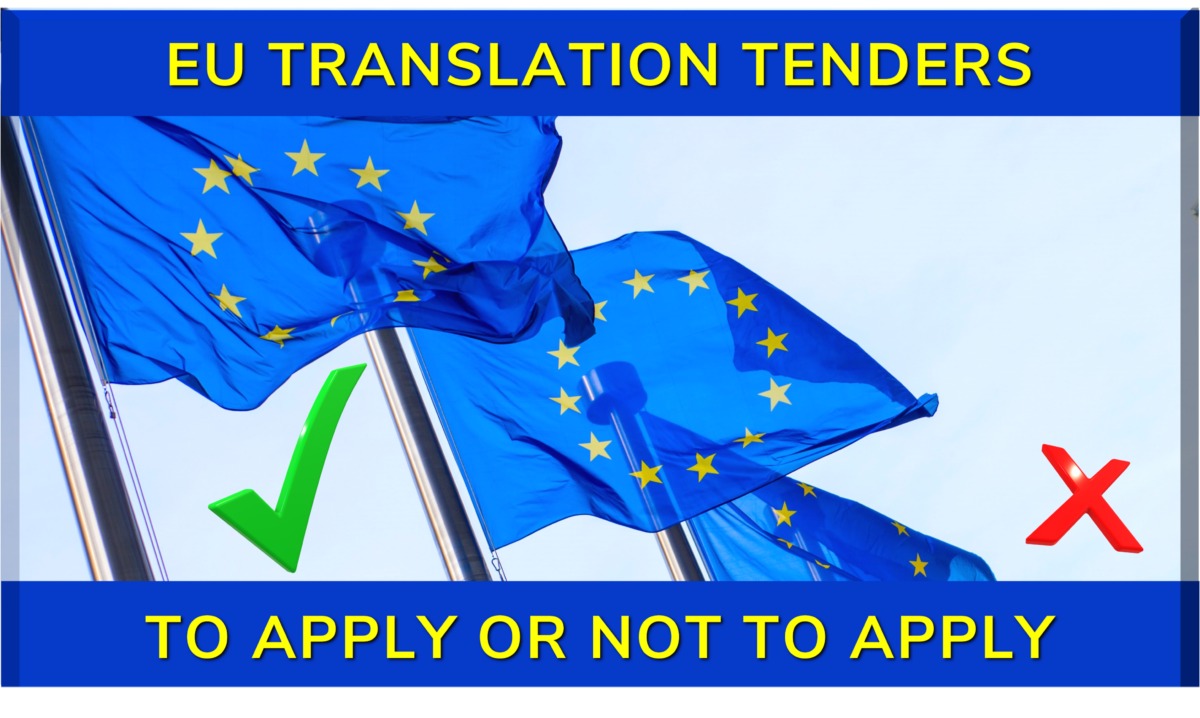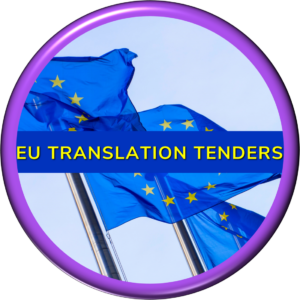
EU Translation Tenders – to apply or not to apply
Translation Tenders
Every now and then, someone comes up with the question of whether it’s worth applying for those big tenders for translation services that are organized by large public organizations and institutions like the European Commission or the European Parliament. The ones where they choose one main contractor and a few secondary contractors. Where the main contractor is supposed to do all the jobs while the others serve as backup.
The answer is …
,

… well, it depends on who is asking the question. If it’s a company that already has established processes and has applied for these tenders in the past, the answer will usually be positive, they would apply again.
However, if you talk to someone from a smaller company or someone who does not have experience with these types of contracts, they will likely feel that:
♦ this is something that is reserved for larger companies,
♦ or for those who already have experience,
♦ or that this is a very time consuming process and not worth investing in,
♦ and last but not least, they will probably think that these projects have low profit margins anyway.
So where do you think the truth lies?
Let us take a look at it.

I would like to check my readiness, but I don’t know where to start
There are several areas of your translation business that you need to check, before making a final decision on whether to apply for one of these tenders. All of them relate to the client’s requirements, both when you apply for a tender and after you have been awarded the contract and start executing the project.
Let us mention just a few of them:
♦ Business Strategy
● What benefits do you expect from this project?
● How will it contribute to your business development?
● How will you organize your translation team for this project?
♦ Previous Tenders
● What has been your experience with similar tenders?
● If you did not win the contract, did you identify what was missing before and improve it?
● Have you made a list of best practices to follow?
♦ Vendor Management
● How many translators/revisers do you already work with who have the required qualification and experience for this particular tender?
● How many more do you need to hire to create a team large enough to meet the required quality and volumes?
● Is your vendor management organized so that you can continually add qualified and experienced members to the project team?
♦ Project Management
● How many project managers are you already working with on similar projects?
● How many do you need to hire to create a team of project managers large enough to meet the needs?
● Do you know what specific skills a project manager will need for this particular project?
● How will you manage peaks in workflow and unforeseen circumstances (while still ensuring quality and on-time delivery)?
♦ Quality
● Is your quality assurance method aligned with client’s requirements?
● How do you ensure that the team strictly adheres to client (or even task) specific requirements and references?
● How do you handle client’s feedback and use it as an opportunity for the entire team to learn and improve?
♦ Training
● How quickly can you organize project-specific training for internal and external team members?
● Who will be responsible for it?
● How will you prepare for a completely new project that you have no idea about?
♦ Translation Technology
● Are you using the same CAT tool as the client?
● If you are using the compatible tool, what additional effort do you need to put in?
● If you decide to switch to the tool used by the client, how quickly can you do so?
● If the client decides to adopt a new (perhaps proprietary) tool, how quickly can you adapt?
♦ Technical Support
● Do you provide technical support for internal and external team members?
The tender is published, do I still have time to check my readiness?
It’s not just about answering whether you are ready or not. It’s about the gaps you need to fill in order to be ready for applying for such a tender. And if you are starting from scratch (and have never applied before), you’ll find that the secret is that the more gaps you have to fill, the earlier you need to start preparing, well before the tender is published.
If you start early enough, you will have time to prepare for the period when the tender is published. If you have already participated but were not awarded the contract, you will work on improving your preparation procedures.
If you have never participated, you will begin by familiarizing yourself with previous tenders, gathering knowledge, and establishing your preparation procedures.
In both cases, you can hire us as translation tender specialist to help you prepare and later execute the project.
Time to start preparing for the EU translation tenders is NOW!
Quality or quantity?
Both.
One of the most important elements that translation companies focus on is quality. Quality that is both defined and demanded by the client and complies with internal procedures.
At the same time, many translation companies like to work on large projects – and these translation tenders are one of them – that ensure a regular revenue stream for a period of the contract. And that usually means large volumes with an unpredictable distribution throughout the year.
♦ Can you guarantee quality?
♦ Can you guarantee the processing of these large volumes, which means that you need to assemble a team of about 30-40 or even more translators and revisers?
♦ Can you guarantee both at the same time?
The answer to all three questions must be YES. Period.
Even if you don’t get selected …
So is it worth it to make all these preparations if you end up not being selected as a main contractor after all (and that can still happen)?
As we explained in our video, participating in translation tenders is not a wasted journey, because even if you don’t get selected:
♦ your internal organization will become more resilient
♦ you will stand on solid ground for any future tender
♦ your company will become impervious to competition
♦ you will learn to sell yourself better
Ask the expert
Last but not least, we invite you to watch our video where we talked about this very topic Ready for the upcoming EU translation tenders?.
And if you have any questions about this topic, you can book a free introductory session to see how we can help you.














